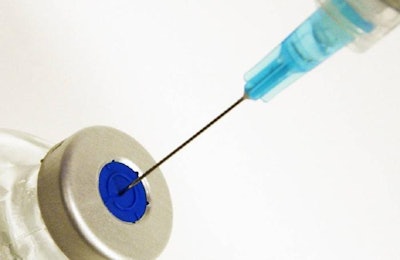
Currently under threat are supplies of around half of all veterinary medicines used in Northern Ireland, according to the Department of Agriculture, Food and Rural Affairs (DAERA).
“I find this matter most disconcerting, particularly as it affects some critical products such as cardiovascular medicines, anesthetics and vaccines, including those that prevent Salmonella and E. coli,” said Agriculture Minister Edwin Poots. “The discontinuation of vaccines in Northern Ireland would have severe repercussions for animal health and welfare here and give rise to unnecessary animal suffering, not to mention the risk it would present to human health and trade.”
To seek a solution to the issues, the minister has called on the responsible departments in the U.K. and urgently requested that the European Commission find “a sensible, permanent and pragmatic solution to the matter.”
Impact of Northern Ireland Protocol
At the core of the issue is uncertainty over the future of the Northern Ireland Protocol.
Following the departure of the U.K. — Great Britain and Northern Ireland — from the EU in 2021, the Protocol was initiated. This aimed to achieve the separation between the two parties while avoiding a trade and customs border between Northern Ireland and the Republic of Ireland, which remains an EU member.
A source of tension since it was signed last year, the U.K. government now wants to power to override this part of the Brexit Deal it signed with the EU over Northern Ireland.
How the Protocol impacts Northern Irish farmers
For some agri-food commodities, the Northern Ireland Protocol is working well, according to the Ulster Farmers' Union (UFU), which represents all of Northern Ireland’s farming community.
However, it causes havoc for other sectors, according to UFU President David Brown.
Under the Protocol, he said, Northern Ireland remains within the EU regulatory zone. Since Brexit, Great Britain is treated as a “third country.” As a result, inspections and other restrictions apply on agricultural products moving between Great Britain and Northern Ireland.
Brown has called for solutions so that the Protocol works for all of Northern Irish farming, which is the territory’s most economically valuable sector.
Call for free availability of veterinary medicines
Regardless of the outcome of the negotiations over the future of the Protocol, the UFU has joined with the North of Ireland Veterinary Association (NIVA) to call for veterinary medicines to remain freely available in Northern Ireland.
A practical solution needs to be found to ensure that the productivity, health and welfare of livestock do not suffer. Putting politics aside, they said, this is a risk as the Protocol grace period ends. That arises on December. After that, all animal health products used in Northern Ireland will have to be licensed by the EU. In the event that no agreement is reached, all U.K. veterinary medicines used in Northern Ireland will need to be re-licensed for Northern Ireland.
According to the UFU and NIVA, some pharmaceutical companies will be unwilling to undertake the re-registration. With the limited market in Northern Ireland, the new licensing may not be cost-effective. This applies to a number of widely used veterinary products, including anthelmintics, anti-inflammatory drugs, vitamins, and vaccines.
“Put simply, if this is not resolved, come the end of December up to half the veterinary products we use here could be lost overnight, with massive consequences for vets, pet owners and farmers,” said Mark Little, NIVA senior vice president.
















